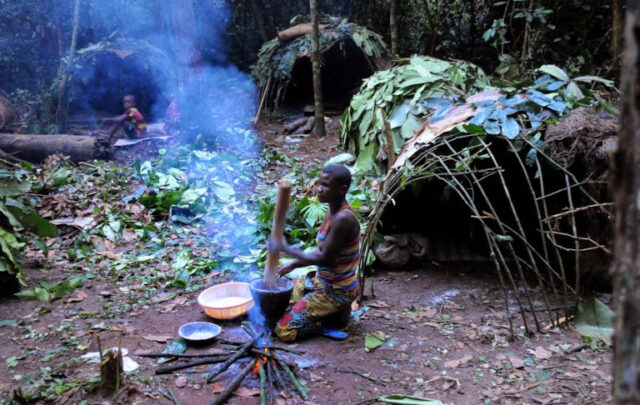
The crowd celebrates in Place de la Republique. by Danny Chivers/New Internationalist
The French government’s attempts to crack down on climate protesters have only made their voices louder, reports Danny Chivers.
Protest is currently banned in Paris. Any outdoor gathering of more than two people with a political message has been strictly prohibited under ‘state of emergency” government powers, following the 13 November terror attacks. Anyone taking part in an illegal demonstration could face fines of $3,972 or up to two months in prison.
The French government imposed the protest ban supposedly in the name of public safety, and yet – as campaigners have pointed out – large gatherings such as football matches and Christmas markets have been allowed to go ahead. Groups of people, it seems, only become hazardous when they have a political point to make. The government has seemed determined to use these powers freely, putting a number of climate campaigners under house arrest, raiding activist squats and attempting to prevent two separate bicycle convoys from reaching Paris.
So protest has been banned, which means if you thought you saw a protest today, you must have been mistaken. If you were at the park opposite the Bataclan at 9 o’clock this morning, where Indigenous peoples from North America and the South Pacific led songs, prayers and blessings for the lives lost in the Paris attacks, and also for the defence of Mother Earth against the extractive industries – well, that wasn’t a protest. It was a ceremony, so no problem there.
Then, at noon, if you happened to see ten thousand people forming a human chain along the pavement from Place de la République to Nation, holding banners and placards demanding climate justice – well, that can’t have been a protest either. Because, you know, protest is banned. Even when large groups started walking up and down the pavement, waving placards, chanting slogans, throwing giant inflatable ‘cobblestones’ in the air and dancing to a brass band – it can’t possibly have been a demonstration, because we all know that would be strictly illegal and immediately shut down. Wouldn’t it?
Of course, another possibility is that the French protest ban is simply unenforceable in the face of a large enough group of determined and passionate people with sufficient public sympathy on their side. Climate change is now so serious – and so urgent – that thousands were willing to risk arrest in Paris today to stand up for that cause, with the support of millions of observers around the world. In the event, there was little that the French state could do to prevent this – at least for the five hours that I was out on the streets observing the protests unfold.

Indigenous peoples and their allies in the human chain. Danny Chivers / New Internationalist
Having succeeded in forming the human chain, many people flooded back to Place de la République, to assemble with their placards and banners (again, in apparent infringement of the protest ban). Groups of protesters, chanting ‘l’etat d’urgence, c’est le climat’ (‘the state of the emergency is the climate’) and ‘Si on marche pas, ce ne marchera pas’ (‘if we don’t march, it’s not going to work’ – it sounds better in French!), began to take over the roundabout around the Place, bit by bit. Within half an hour, the traffic had been banished and the road was filled with dancing and cheering people.
Their message was clear, from their chants and their banners: as governments prepare for a climate summit that will deliver, at best, a catastrophic 2.7 degrees of global warming, the voice of the public is more important than ever. My New Internationalist colleagues and I spoke to people in the human chain whose lands and livelihoods were already being destroyed by rising sea levels, melting ice, and the pollution from fossil fuel extraction. We met people today who had lost friends in storms exacerbated by carbon pollution. Climate change is no longer a future threat – it is an unfolding act of violence in which rich governments and corporations are actively complicit. We cannot sit back and expect them to solve this problem for us; we need serious action by the public to challenge the political status quo.

The 2pm occupation of Avenue de la Republique. Danny Chivers / New Internationalist
Today, as millions marched around the world, the crowds in Paris also refused to be silenced. At 2.00pm, several thousand people left the Place and marched – yes, marched – down Avenue de la République. After a few hundred metres, they were met by a wall of riot police. But rather than pick a fight, the crowd simply filled the road, leaving a clear space between themselves and the police, and chanted in defiance. Some gas grenades from the police – and one small charge – failed to deter the crowd, who remained there chanting ‘liberté’ and ‘police state’ for a good 15 minutes. Then, having seemingly decided they’d made their point, they turned and marched back to the square, to rejoin the occupation there. As I left Place de la République at 2.30pm, the crowds still filled the square.
SEE ALSO: Global Climate March – pictures from around the world
A few weeks ago, we were expecting hundreds of thousands of people to take part in a legal march in Paris today. This would have been a powerful show of strength from the climate movement, but arguably what happened today was even more powerful. Thousands of people were willing to risk arrest and police violence in order to demand justice for those most affected by climate change.
By seeking to silence political expression, the French government has only succeeded in making it louder.
Follow more events at COP21 in Paris on our New Internationalist media web hub.





